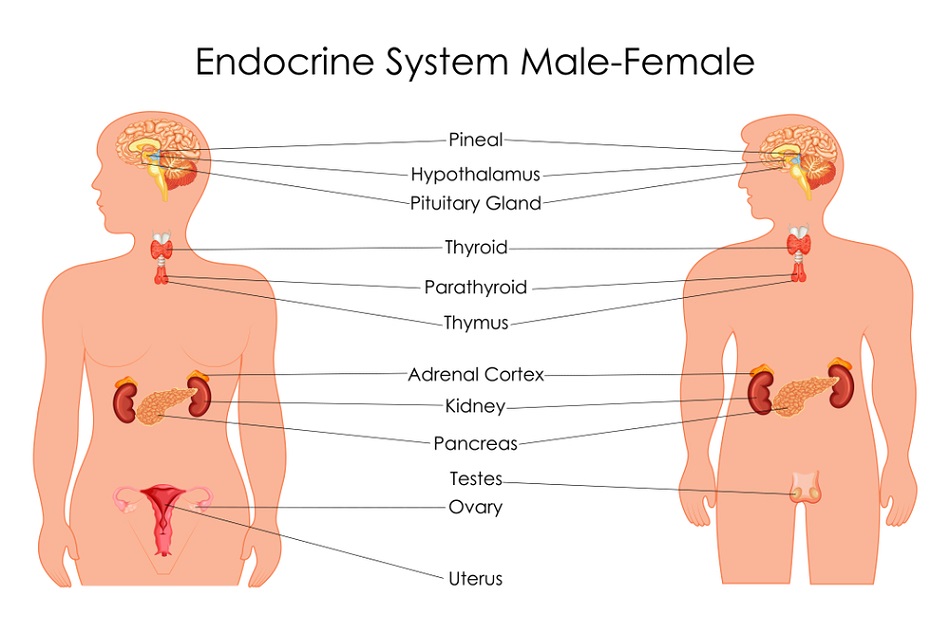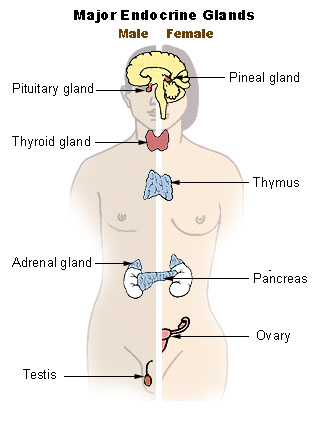Definition
Endocrine glands are tissues or organs that excrete chemical substances (hormones) directly into the blood. Common endocrine glands are the hypothalamus, pineal, and adrenal glands. Endocrine glands secrete hormones directly into the bloodstream or into the intercellular space, allowing the hormones to reach their target.
Overview
Endocrine system glands are spaced throughout the entire body. They release a wide number of hormones which control the metabolism and function of other cells. Exocrine glands, by comparison, secrete substances inside and outside of the body using ducts. These two methods of transport mark the difference between exocrine and endocrine glands.
While in the bloodstream, the hormones are able to travel through the body’s circulatory system to reach distant targets. Hormones, in turn, will carry out varied functions in the body depending on the receptors they bind and the quantity of the hormone that is present. These changes will reflect the balance of secretion and excretion of hormones in the body. Their duration will depend on the hormone’s inherent half-life and activity levels.

As you can see in the image above, men and women share all of the same endocrine glands, besides the reproductive organs. While reproductive organs have the primary function of creating and releasing gametes, they also release a number of hormones which affect the body in different ways.
Examples of Endocrine Glands
Pineal Gland
The pineal gland is a small gland located within the brain that serves as a great example of endocrine glands in general. The pineal gland is activated by neurons connected to your eyes. When these nerves are activated by light, the pineal gland is repressed. When nighttime comes, and the light reaching your eyes decreases, the pineal gland becomes activated.
The pineal gland secretes melatonin, a hormone which activates our sleep cycle. By releasing this hormone when it gets dark, the pineal gland is helping your body coordinate for sleeping. This includes changing your respiratory rate, brain patterns, and even digestive patterns.
Thyroid Gland
The thyroid gland is found in your throat, just below the jaw. This gland secretes a number of hormones that act on your metabolism. Thyroid hormones can increase the rate of your cellular metabolism, or decrease it. These activities are in part directed by another endocrine gland, the pituitary, which signals to the thyroid which hormones to release. In turn, your metabolism is regulated. In fact, a nonfunctioning thyroid gland often leads to drastic weight gain or loss, depending on the malfunction.
Function of Endocrine Glands
Releasing Hormones
The endocrine system derives its power from coordinating the interactions that take place between the hormones that are released by this network of glands. Endocrine glands themselves will inherently be able to make, secrete, and store hormones for future use. This ability to store hormones for later release is useful for modulating responses to certain stimuli. Depending on our developmental needs at whichever stage in life we are in, our endocrine system will ensure that a proper hormonal balance is in place so that we release more or less of certain hormone based on these needs. Many factors can compromise this balance, however, resulting in endocrine disease.
One such instance is when too much or too little hormone is released from a given endocrine gland. Another problematic scenario is if an afflicted patient’s blood supply is not strong enough to carry the hormones the distance they need to be carried to reach their target organs. Furthermore, once the hormones reach their target site, the tissue must have an adequate number of hormone receptors to maintain this intricate balance.
Responding to the Nervous System
The actual release of hormones by endocrine glands is tempered by the nervous system. Hormone release will be directly tied to the body’s response to certain neural or hormonal stimuli. Hormones come in various forms; some may present as fatty steroids or long-chained amino acids. These substances will travel through our bloodstream to reach specific tissues or organs.
The endocrine system will regulate our metabolic processes, our appetite, our growth, and even our sleeping patterns. Our endocrine glands will essentially help regulate our body’s energy distribution in order to wire all of these varied processes. Many tissues in our bodies have the ability to release chemical substances into our blood, but we will discuss the most major endocrine glands in more detail.
List of Endocrine Glands

The figure depicts the major endocrine glands of the human body.
Within the Brain and Neck
Among the most important endocrine glands in the human body is the hypothalamus. In spite of its small size, this part of the brain releases crucial chemicals that influence the body’s internal homeostasis as well as the pituitary gland. Its hormones include oxytocin and growth hormone, among many others.
The pituitary gland, in turn, is another endocrine tissue that releases hormones related to growth, mental development, and sexual reproduction. Moving on to the pineal gland in the brain, the pineal body will create and release various hormones, including melatonin, which regulates our sleep and waking cycles and eventual sexual maturation. The thyroid is an endocrine gland in the neck that releases thyroid hormones that help maintain our body’s metabolic and energetic processes. The parathyroid gland, on the other hand, lies behind the thyroid gland and secretes chemicals that allow for normal bone development.
Within the Body
The thymus has much more important roles in immune health during our childhood (via T cell production), as it is eventually phased out by fat in post-pubescent children. The pancreas is another endocrine gland that releases insulin in the body, which importantly allows for sugar in the blood to be metabolized.
Moving southward to the kidneys, the adrenal glands that lie above each will secrete adrenaline hormone during strenuous fight or flight situations. This modulation will likewise influence the way our bodies use energy.
Lastly, our sex organs are a major type of endocrine gland. Ovaries in women will create estrogen and progesterone derivatives that help with our sexual development and will aid in the release of eggs for future fertilization. Thus, all of these glands orchestrate large processes that keep our species alive and thriving. Hence, the evolutionary importance of having endocrine tissue!
Major Endocrine Glands:
- Hypothalamus
- Thyroid
- Parathyroid
- Pituitary gland
- Adrenal glands
- Pineal gland
- Pancreas
Quiz
